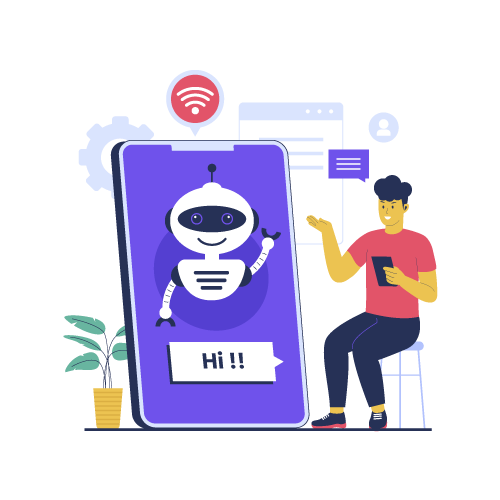AI Revolutionizes Call Centers

Artificial Intelligence (AI) is transforming call centers, ushering in a new era of efficiency and customer satisfaction. As AI revolutionizes call centers, it brings innovative solutions such as chatbots, virtual assistants, and speech recognition. In this article, we’ll explore how these AI technologies are reshaping call center operations, enhancing customer interactions, and driving business success.
AI Revolutionizes Call Centers
Chatbots: The First Line of Assistance
Chatbots have become a staple in call center operations. These AI-driven virtual assistants are available around the clock to handle routine inquiries, providing quick and accurate responses to common questions. By offloading repetitive tasks from human agents, chatbots free up valuable time and resources. Moreover, chatbots streamline interactions by responding instantly to customer queries, which is a stark contrast to traditional call centers where wait times were longer.
Virtual Assistants: Augmenting Agent Capabilities
Similarly, virtual assistants, powered by AI, enhance the capabilities of human agents. They can access vast amounts of data, provide real-time information, and assist agents in resolving complex issues faster. Consequently, this results in improved first-call resolution rates and higher customer satisfaction. Additionally, virtual assistants infuse call centers with a burst of intelligence, thus supporting agents in delivering more personalized and efficient service.
Speech Recognition: Enhanced Understanding
AI-driven speech recognition technology is revolutionizing call center interactions. It enables automatic transcription of customer calls, thereby making it easier to analyze and extract valuable insights. Furthermore, agents can use real-time speech recognition to receive prompts and information, leading to more natural and efficient conversations.
Predictive Analytics: Anticipating Customer Needs
Predictive analytics, powered by AI, analyze historical data to forecast customer needs and behavior. This allows call centers to be proactive in addressing issues before they escalate, providing customers with tailored solutions and a seamless experience.
Improved Call Routing: Faster Resolutions
AI algorithms can intelligently route calls to the most suitable agents based on factors like skill set, past interactions, and customer profiles. Therefore, this ensures that customers are connected with the right person to address their specific needs, reducing call duration and enhancing satisfaction.
Quality Assurance: Enhanced Monitoring
In addition, AI-powered quality assurance tools monitor agent-customer interactions for adherence to scripts, compliance, and customer sentiment. As a result, they provide actionable insights to improve agent performance and customer experiences.
Cost Efficiency and Scalability
AI technologies offer cost-effective solutions for call centers. They can scale easily to handle fluctuating call volumes without the need for additional manpower. Thus, this scalability allows businesses to optimize resources efficiently.
Conclusion
The integration of AI technologies into call center operations has revolutionized the way businesses interact with their customers. Chatbots, virtual assistants, speech recognition, predictive analytics, and advanced call routing systems are reshaping call centers into hubs of efficiency and customer satisfaction.
In summary, AI revolutionizes call centers by not merely serving as a tool, but as a transformative force. It empowers agents, reduces wait times, enhances understanding, and improves the overall customer experience. By harnessing the power of AI, businesses can elevate their call center operations to meet the evolving demands of the digital age.
Contact Us
Are you ready to transform your call center with AI? Contact us today to learn how our innovative solutions can help you achieve unparalleled efficiency and customer satisfaction.
Categories
- Agent Performance & Training
- AI solutions
- Business Growth
- Call Center Performance & Productivity
- Call Center Software Platform
- Call Center Technology & AI Integration
- Call Center Training
- Call Center Workforce Management
- Call Monitoring
- Cloud-Based Solutions
- Customer Experience
- Data Security
- General
- Insights
- Integrated Customer Service
- News
- Omnichannel Communication Strategy
- Omnichannel Support
- Quality Assurance
- Tech


